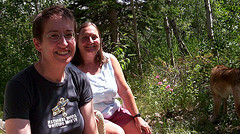Epiphanies About Flash Fiction
Sun 2009-08-23 14:33:31 (single post)
- 500 words (if poetry, lines) long
As I mentioned a few entries ago, "Sidewalks" is in rewrites. Which is an awesome thing, because without someone else to push me, I might have left the story alone, never knowing how much better it could be.
And it is better. It started out as a story about a guy whining generically about love lost after having witnessed an extraordinary event. And, well, it still is about that, but the whining is very specific, the love was lost in a particular way, and the extraordinary event is necessary and not easily replaceable by some other extraordinary event.
There are a lot more details in the story. Not necessarily spelled out--that was how I ruined earlier drafts--but they're concrete in my head. They weren't, before. The rewrite request forced me to think about these things, to do a little worldbuilding, for all that the world is our own and the story's only 500 words long.
If you'd asked me last year to tell you how I knew whether a story should be in "short" or "flash" form, I'd have told you, "Short stories are told via a single scene, or a series of scenes. Flash-length stories are implicit in a single moment." I'd still say that today, I think, but putting it that way leaves something important out.
The difference between short stories and flash fiction is in the word-length required to tell them. But a story's word-length is not the same as its size. Short stories and flash fiction stories are exactly the same size as each other, and as novel-length stories, trilogy-length stories, novena-length stories: as big as the world. The characters must be equally real, their worlds equally huge. Word length is simply the frame through which the reader views the story.
Which means there is worldbuilding to be done and characters to be developed, no matter how short the story form is. Developing them fully is necessary before the author can choose which words, which images and thoughts and dialogue, belong inside the picture frame.
Anne Lamont, in Bird by Bird, talks about the one-inch picture frame that sits on her desk and reminds her not to try to tackle the entire task at once. "Just take it bird by bird," she recalls her father telling her overwhelmed brother on the occasion of an overdue homework assignment; similarly, she tells herself to just take her own writing inch by square inch. But that square inch of story remains part of an entire world big enough to live in, big enough to encompass untold thousands of stories.
I've been writing flash fiction for years, but only now do I understood that the flash fiction form is hard.
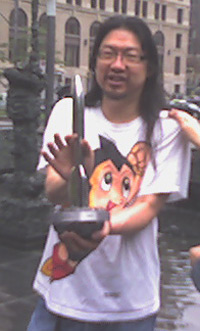
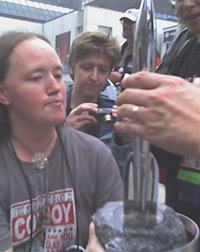
WorldCon 2009, Monday: In Which I Lay Hands Upon A Hugo
Mon 2009-08-10 21:54:42 (single post)
The aforementioned irrepressible Frank Wu took his Hugo for a walk today. He was one of the scheduled Stars for the final installation of Strolling With The Stars, and he arrived in the mist and rain with rocket ship in tow. And he says to fellow Strolling Star, Stephen Segal (Best Semiprozine, Weird Tales), "Why didn't you bring yours?"
We paused for the daily group photo, and Frank let everyone who wanted a closer look get a closer look. It's worth a closer look--it's an object of great beauty. The rocket ship is just taking off from an asteroid, and if you look close you can see the launch flames are in fact a collection of iridescent maple leaves. I got a very close look. I got to hold it. And what they say about this year's Hugo is true: It's frickin' heavy! It's a frickin' rock!
(Many thanks to Peter Flynn, who came all the way from Ireland, for taking pictures with his cell phone and emailing them to me. If you want to see more pictures, all the group shots will be posted sometime soon on the Anticipation '09 Facebook or LJ or somewhere. 'Twas Stu Segal who took them.)
Now, to sleep, to wake early tomorrow and toss my stuff into its respective containers and boogie down to the train station for a 9:30 AM departure. I missed the dead dog party tonight due to spending lots of lovely time with fellow Viable Paradise X alumni Barbara and Evelyn, but I will be attending the "carrying away the dead dog's corpse" party (as I continue to find it amusing to call it) in the cafe car on Amtrak's "Adirondack" on which several of us Making Light regulars will be riding together.
WorldCon 2009, Sunday: The Hugos and The Community
Sun 2009-08-09 22:03:35 (single post)
This will be a brief post* and not very polished as blog posts go. I'm tired and attempting to make an early night of it. I know, I know--an early night at WorldCon? That's unpossible! Yet I shall try.
Tonight's big event was the awarding of the Hugos, when the World Science Fiction Society presents big heavy rocket-shaped trophies to people what done good. This is my second time attending the Hugos, and once again they made me both giggly and teary-eyed. The reason for that is why I wanted to blog a bit before I slept.
Towards the beginning of the presentation, we get the IN MEMORIAM list. Names of those members of ours community who have died since the last WorldCon are projected on the big screens. Charles N. Brown, founder of Locus Magazine. Forrest J. Ackerman, "Mr. Science Fiction." And, heartbreakingly, the list went on for pages. After each name was a word or two describing what their role had been: author, editor, artist, etc.
The list was a very inclusive list. Walter Cronkite was mentioned, though he was not someone you'd have thought of as being part of SF/F fandom. His tag was "space exploration enthusiast." Michael Jackson, too: "genre music video." Fandom is ecumenical and all-embracing. Many of the people we count as our own might be surprised to find themselves in that number.
So that's the easy answer to why I get teary. But it goes deeper. See, a lot of the names, they got tagged with just one word: "Fan."
Science fiction and fantasy has its celebrities. Dang straight it does--ask Neil Gaiman, who appears increasingly chagrined as the years go by at his rock star status. (He observed at the "Finding Fandom" panel that his power to create a roomful of applause with a single word--"Sandman"--was a dangerous one that ought only to be used for good. He has been heard to observe that his simply walking into a con party halts all conversation.) And yet in fandom, "celebrity" doesn't imply the same sort of separation between the celeb and pleb as it does in other entertainment industries (my parenthetical comments last sentence notwithstanding). The line between fan and pro blurs to the point that someone might get nominated for "Best Fan Writer" the same year they're nominated for "Best Novel." The line blurs because every pro started out a fan, many fans aspire to be pros, and every pro remains a fan. Thanks to cons, acquaintanceships and friendships form across that blurry line and grow strong.
Tonight, John Scalzi won a Hugo for Best Related Book. Last year, I sat down with six or seven other fans at Scalzi's kaffeeklatsch and we all enjoyed a rambling conversation with him about anything and everything. Tonight, Ellen Datlow won a Hugo for Best Editor, Short Form. Friday morning she and I and several other early risers all chatted beside the fountain while waiting for the daily walk around town to get under way. Tonight, Elizabeth Bear won a Hugo for Best Novelette. This morning, I sat in a small conference room with a handful of WorldCon attendees to hear Bear read us some excerpts from her upcoming novel.
And all of us have been passing each other in the hallways, nodding to and smiling to and greeting each other right across that pro/fan boundary line that isn't much of a boundary at all. "Fan." It's a title we all share here. It doesn't get replaced by other titles--it just gets augmented. "Fan." It's title enough to get you missed sorely by the rest of the community when you're no longer with us here on Earth. The inclusiveness of that is truly touching. It reminds me that "home" isn't just a place; it's people too.
So that's the second reason the Hugos make me teary. The third, which is also the reason I get giggly--well, you watch. Watch what happens when someone gets the award and comes up to accept it. Watch Frank Wu (Best Fan Artist sorry, got that wrong before) galumphing up onto the stage, tripping over his own feet up the stairs, out of breath with hurry and utter surprise. Watch him playing with his Hugo, zooming the rocket ship around in the air and making whooshing noises. Watch him bounding back to his seat, still wielding his Hugo in toy rocket position, while the next category gets underway. And this isn't even his first Hugo, either! It's heartwarming and funny and makes you want to go over and give him a hug. Because you'd be galumphing and bounding and whooshing, too! And listen to the recipients who can barely utter their thanks over the sudden lump in their throats. Or the ones who get punchy and start interrupting their own acceptance speech trains of thought by looking down at the trophy they're holding--as though they can't believe they actually have one in their hot little hands--and blurt out, "Fuck this thing is heavy!"
The Hugos event is full of those little human moments--those moments when you realize, with the force of epiphany, "We're all humans together, and I love these humans, they're funny and wonderful and just like me, really." You want to just encircle the entire auditorium in your arms and not let go.
So I'm a little weepy right now and full of smiles. And very, very sleepy. And now that I have said what I wanted to say, hot damn! I get to go to sleep now! G'night!
* or not. Brief, that is.
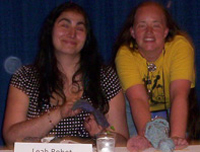
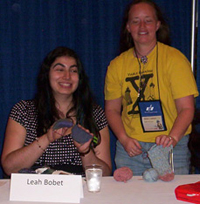
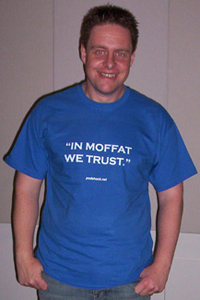
WorldCon 2009, Friday: Squee And More Squee
Fri 2009-08-07 23:17:06 (single post)
- 494 words (if poetry, lines) long
I'm in Montreal today, and will be until Tuesday morning. Montreal is where WorldCon is this year. It is full of lovely architecture, found art, great food, and cab drivers that speak only French. This weekend it is also full of science fiction, fantasy, and horror fans enjoying the heck out of each other's company.
Today I took some pictures. That's kinda news. I carry a camera with me but I'm sort of missing the shutterbug instinct, so the machine stays useless in the bookbag most of the time. It stayed there during this morning's "Stroll With The Stars" (a morning walk about town in company with several Industry Names, sort of a moving kaffeeklatsch without the sign-up sheet). That was silly. But I took it out for a couple of things today.
First, there's Leah Bobet doing her half-hour of autograph duty. Leah writes fiction, critiques manuscripts at this year's writing workshops, and edits the online speculative fiction magazine Ideomancer. Which is where I submitted "Sidewalks" at the end of June. Leah's response to this was not a rejection letter, but a rewrite request back on July 20th. This is a first for me, for a fiction submission. And it blows my mind. I always thought short fiction, especially short-short fiction, pretty much got accepted or rejected as is; how could a 500-word story be worth the time an editor takes going back and forth with the writer over revisions? Short fiction magazines are on tight budgets as it is! And yet here we are.
Rewriting "Sidewalks," as I've said here before, scares the crap out of me. Such a short story is like a tightrope walk; it balances on such a fragile line between the twin pitfalls of overwriting and underwriting. And I've already taken some falls on the overwriting side, making me really nervous when I'm asked to make something clearer or more explicit. When the response to my first rewrite came back asking for a second, I swear my mental reaction was "O Gods, what now? Don't make me do this! I'll break it for sure!" But then I printed out Leah's email, poured myself a shot of Glenmorangie and a bathtub of piping hot water, and contemplated the task in as relaxed a manner as my high-strung little self could manage.
I'm extremely glad for this process, and not just because it's not a rejection letter. Without the rewrite request, I might have been content with the story as it was. Sometimes it takes another reader to point out that the story isn't all it could be, and what it could be is worth striving for. Now, even if everything falls through and this process doesn't end in publication, I will still have a vastly improved story. That's pure gold.
I sent off the second rewrite shortly before WorldCon. I'd refrained from blogging about it while the process was still ongoing, up to now, but it's become too hard to resist. I mean, I've got pictures of Leah and me proudly displaying our knitting at WorldCon! (Leah is knitting her first pair of socks. They have a lovely ribbing that's a sort of barberpole lace. It's a pattern from Ravelry whose name I forget.) So not only am I all a-squee over having a fiction editor take this kind of interest in my story, but on top of that I got to geek out about knitting with said editor! How cool is that?
The third picture is Paul Cornell. Paul won a Hugo last year for a two-part Doctor Who episode that he wrote. It was based on a tie-in novel from several Doctors ago which he also wrote. And some readers may have noticed that a chapter in that novel bears a title ripped straight from a Kate Bush lyric. This sort of thing rarely turns out to be coincidence. Paul is a huge Kate Bush fan, and today I got to hear him give a presentation on her music as great fantasy writing. Do you know how seriously cool it is to hear someone whose work you admire totally geek out--in an educated, serious, literature-analysis way--about someone else whose work you admire? It's way cool. In fact, Paul has the coolest theory I have ever heard about the plot of The Ninth Wave (essentially Side 2 of Hounds of Love). (It involves alien abduction.)
This is what makes WorldCon the beautiful wonderful miraculous magical event that it is. Finding out who your heroes consider their heroes. Hearing them enthuse hard in full fan mode about their heroes. Also, finding out that you have more in common with those in the industry than just the industry itself. And I haven't even gotten into the other panels I attended today, or the great conversations at the Making Light party, or or or or or...
It's 3:30 AM. I should wrap this up and go to sleep. Good night!
In case you were wondering...
Tue 2009-07-28 13:18:41 (single post)
I've fixed the blog bug concerning the "Works Progressing" links. Now, when you click a manuscript title, you'll get a list of blog entries to do with that manuscript. You'll get a page header showing the manuscript's title and word count and, if relevant, hours edited (which I'm pretty unreliable at keeping count of, so don't count on it - har har, I pun).
And after I've had a chance to go through my database and make sure everything's presentable, you'll get a bit more blurbage about the manuscript and an excerpt to read. When will I get this done? Sooner than you think! 'Cause this week is actually looking like a manageable week!
More on the writing front later this afternoon. Until then...
Ned Writes 2009! - Weekend Writing Retreat
Tue 2009-07-21 15:04:07 (single post)
- 3,576 words (if poetry, lines) long
I spent the better part of this past weekend with my Tuesday writing group in Nederland (elevation 8,233) where we did what writers do when we get together: We wrote. A lot. We also ate a variety of yummy things, walked our feet off, gawked at baby swallows at the post office, oohed and aahed at the scenery, lounged in the hot tub, and enjoyed the constant affections of two cats and a dog.
Tenaya took advantage of her family being out on a fishing trip to invite Ellen and I up to her house, which is cozy and spacious, well furnished in creature comforts, and also possessed of possibly the best view in town. See photo 1: this is the view from Tenaya's porch. The rooftops of central Ned, and the lake behind it--you can just make out the dam. From the desk Tenaya set me up at, I could see this view each time I looked out the window.
Next photo: Tenaya and Ellen smiling big happy smiles of accomplishment! This was taken Sunday afternoon just before Ellen and I departed for the bus station.
We had spent that morning and the day before alternating 2-hour writing sessions with breaks for food, exercise, and self-pampering. I got two brand new scenes for a brand new short story written ("Janet's Fibercrafts and Miscellaneous Services", temporary working title), and I submitted my very first content article to Demand Studios (it was subsequently approved and I got paid for it, yay!). Tenaya and Ellen were both deep in the organization stage of novel revisions, condensing scenes and considering character story arcs. Occasionally hummingbirds would buzz the garden (in which Tenaya and Ellen are sitting in this photo), or the pets would wander through, or someone would put on another pot of coffee or tea.
Group writing retreats: I can't recommend them strongly enough. With writing comes a multitude of snares: loneliness, aimlessness, self-doubt and self-effacement, even despair. A writing retreat can trip all those traps and render them harmless--at least temporarily. The constant company of friends who are equally determined to Get Writing Done is a good antidote for the solitary nature of the work. Holding each other to an agreed-upon schedule adds structure and inspiration to keep a writer on task and excited about it. And the very act of dedicating a weekend together to Writing And Nothing But Writing goes a long way to combat the everyday wear-and-tear damage a writer's confidence can sustain: "Are you working, or are you just writing?" "Am I interrupting something? Oh, you're just writing." "Everyone writes--how hard can it be?" Writers writing together are constantly reassuring each other, just with their continued presence and dedication, that what we are doing here is important. Important enough to protect it by turning off the phones, leaving everyday responsibilities in the hands of a kind friend or family member, to beg off invitations and social would-be obligations with "When--this weekend? Oh, I can't. I'll be busy writing."
We talked about having another one of these retreats soon, taking turns as hosts. I'm going to try to reserve us a weekend at the Sheraton Mountain Vista in Avon come late August or September; that worked out really well a couple years back. It's gorgeous up there in the Vail Valley. But if that doesn't work out, there's no reason we can't just congregate at my house. It's a pretty ordinary space compared to Nederland or Avon, sure, but even ordinary spaces can be consecrated to a purpose. Ask Tenaya: However exotic the location seemed to me, to her it was simply her house. She lives there day in and day out. She invited us up to help her make it special--by virtue of how we used it. Even a small corner of a two-bedroom apartment in the middle of the city can become special, dedicated to a special task. And never doubt that the task is special. Special enough to devote one's working life to it.
Live From Second Life: The Written Word Writers' Circle
Wed 2009-07-08 15:03:33 (single post)
- 5,737 words (if poetry, lines) long
This is precisely what Second Life does best, in my opinion: brings together a virtual group to do the same sort of stuff you might do with a group in real life, only without the travel expenses, while using the tools of the virtual world viewing application to enhance the group experience. That doesn't mean I don't indulge in casino games or spend spare computing cycles with my avatar in camping chairs, mind you; I'm only human and I like free Linden Dollars as much as the next person. But it's the group activity potential that really gets me excited about virtual worlds in general and Second Life in particular.
My avatar, Kavella Maa, is sitting in the audience at a place called "The waterstage and writers' circle". (For those unfamiliar, that link will take you to a portal web page which prompts you for permission to launch the Second Life world viewer and teleport you there.) There are cushions on the wooden dockside risers that you can click on to make your avatar sit properly (which usually works as advertised but sometimes leaves you facing off to the left so you have to get up and try again).
On stage is a microphone where open mic participants stand to read their works.
When an author mounts the stage, everyone in the audience receives a notecard (a text file object that you can create, save, keep in your inventory, and copy to others' inventories) with the text of their material on it. The authors read their material aloud; little green icons that mean "sound emanating from this point" appear above their heads, denoting that the voice you hear is indeed coming from the person controlling that avatar. If you use your camera controls to zoom in on the author reading, their voice gets louder, mimicking the effect of moving closer to hear better in a face-to-face group. (You can also set your preferences to modulate volume based on your avatar's position rather than your camera's.)
Meanwhile, the audience can comment as freely as they like on Local Chat, or even greet new arrivals with great verbosity, without fear of interrupting; Local Chat is text-only.
Each Wednesday at 2 PM Pacific Time, this Writers' Circle meets, organized by Jilly Kid of the Writers Guild - that's a group you can join - and MC'd by Hastings Bournemouth. Jilly sends out notices reminding the group about the event--and assigning a fun theme which authors may choose to incorporate into their offerings. This week, the theme is "Teddy Bear Picnic Day". Attendees can click on a sign beside the stage to have a free teddy bear T-shirt dropped into their inventory. (I'm wearing mine, of course.) Among the works written specifically for the theme are "Life's No Picnic," a poem by Aribella Lafleur, who wonders how teddy bears can even have picnics, having tummies full of fluff as they do; and "The Homophobic Hunter and the Un-caring Bear," a poem with sly humor and a wonderful rhyme scheme by... oh, dang it! the author didn't include his avatar name in the notecard! Dude, by-lines are important! We're also hearing non-themed excerpts from longer works by Huckleberry Hax and Arkady Poliatevska (whose profile appears strangely devoid of URL today, or else I'd make that a link too.
This is, of course, an incomplete list of authors who read today. I'm not taking minutes here.
There are flaws, of course. A bit of lag here and there, some authors having mic trouble, the odd audience member promoting themselves to co-presenters by commenting over the voice channel at inappropriate times. Y'know. Flaws happen. But, on the whole, the event and venue make me happy. It's a virtual world app doing what it should, and it's doing it about writing. I get to hear the voices of people whole states or even oceans away from me while I sit comfortably in the Seven Cups Tea House in Denver and work on a short story rewrite*. And I'm thinking about what I might share next week, if I get my butt in gear in time.
*Short story rewrite: Took another look at "Lambing Season" before resubmitting it and was unhappy with the blah-ness of the first few paragraphs. Am reframing the entire story via a top-end rewrite. Am hoping I have not killed the poor thing.
Into the Slush: June 2009
Tue 2009-06-30 15:41:38 (single post)
- 403 words (if poetry, lines) long
This morning, whilst scribbling today's date in my Morning Pages notebook, I suddenly realized that June in fact only has 30 days in it and not, say, the 42 or so I must have assumed. Plenty of time to get a story ready for its first submission! Or, y'know, not.
But if it's under 500 words long, we're looking at possible, right? And if it's 400 words of a story that's been waiting two years to be submitted, when I originally meant it to go from creation to submission in the space of a week--well, it's about time, right?
Thus ends the editing paralysis surrounding "The Day the Sidewalks Melted".
I went back to the original draft, the one I sent around to friends on the day I first wrote it. Then I read my rewrite, the one John told me died on the page. And he was right. I thought it corrected for clunk? It was the clunk. Comparing the two drafts was like a concise lesson in how less is more: two or three sharp details can do a much better job of painting a picture than can twenty. And when the story is about an event that none of the characters (nor even, quite, the author--shh!) understand, but can only describe by its effects, then two or three sharp details about those effects is what the story needs.
Which isn't even getting into the concision required by the flash format (400 words; each one has to be right), or the different implications of different narrative frames (this is not a scholarly treatise! this is a break-up story).
So I sent it off and soon received Ideomancer's auto-response. I did not seek anyone's comments on the draft, because what I really don't need are another two years of paralysis. John will read it tonight. (I hope he likes it!)
And now I am no longer thinking, every single morning, "I really need to repair and submit 'Sidewalks'". Yay. On to the next thing!
On Residual Income Schemes
Mon 2009-06-29 13:14:40 (single post)
W00t! My first eleven cents from eHow.com! Go me!
...that's all.
On Desired Bookburnings In Wisconsin
Wed 2009-06-17 19:00:57 (single post)
Apparently there's this elderly group of self-described Christians in West Bend, Wisconsin, who feel that the presence of non-anti-homosexual literature in their local library ("Baby Be-Bop, a young adult novel in which a boy, struggling with his homosexuality, is beaten up by a homophobic gang") is damaging their mental and emotional well-being and may in fact be putting lives in jeopardy. They want a lot of money in compensatory damages for being exposed to a book that teaches that beating up gay teens is bad (and that gay-bashers have a tendency to shout homophobic slurs while engaged in gay-bashing). They want, further more, all copies of this book delivered unto their pious, shaking hands, that they may pitch them into a holy bonfire and reduce them to char and ash, for the public's eddification and moral betterment.
Says Neil Gaiman, wise man that he his,
...if their mental and emotional well-being was that damaged by the proximity of a Francesca Lia Block book, I'm just happy they didn't pick up and read the library's copy of American Gods; their eyes would have been fried and their lives put so far in jeopardy that their nearest and dearest would have been ordering caskets before the end of Chapter One.To which I can only reply, in my best wide-eyed Temeraire-like plaint, "Oh! but can we not? It sounds most satisfying, and would improve Wisconsin to no end."

